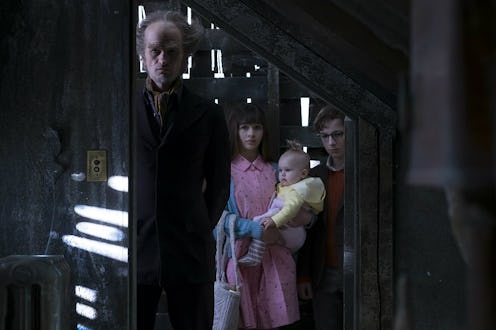Books
Why My Morbid Younger Self Needed Lemony Snicket

I was an odd child. Don't take my word for it; my parents will happily confirm this, insisting that my childhood fascination with the three hyenas in The Lion King over the kinder, more popular characters marked me as a weirdo from the start. My offbeat sense of humor and penchant for morbidity went beyond an affinity for Wednesday Adams and kiddie dark comedies, though: I can clearly remember the first time I became aware of my mortality before the age of 10. While J.M. Barrie says in Peter Pan that children realize they must grow up and die at age two ("Two was the beginning of the end"), I held on to my innocence a bit longer. Still, I have a vivid memory of watching The Rugrats in my grandmother's kitchen and realizing that, unlike those cartoon characters, I was a real person who would one day die. I was too young to properly deal with these feelings, and instead lay face-down until the panic stopped. I recovered, and continued living a normal life, despite frequent repeat episodes.
What I'm basically saying is that a Rugrats episode lead me to have a juvenile existential crisis, which is probably not what Nickelodeon intended.
My new-found preoccupation with my mortality led me to A Series of Unfortunate Events by Lemony Snicket, a series of novels that I'm quite honestly amazed ever got published. The novels revolve around the misadventures of the Baudelaire orphans, three siblings who lose their parents in a fire and stand to inherit a substantial fortune. Their future wealth attracts the greedy and cruel Count Olaf, who spends the majority of the novels chasing the children and killing any guardian who tries to protect them. The title of the series isn't ironic; in 13 novels there are almost no happy endings, as the orphans face one misfortune after another.
It was everything my weird, morbid little heart wanted.
In a library full of lighthearted Baby-Sitter's Club adventures and "love saves the day" Harry Potter novels, ASOUE dealt with harsher truths: sometimes good doesn't triumph. In fact, sometimes no matter how hard you try, and how brave and true you are, the bad guys are going to win. The novels were hysterical and bizarre, but they were also incredibly violent and at times unflinchingly cruel towards their young heroes. Weirdly enough, they were also what I needed.
Let's be clear: I didn't have a childhood dictated by some sort of all-consuming depression, nor was I preoccupied with death. I was strange, but I still made friends and was happy most of the time. I was just weirdly aware of my own mortality and turned to dark humor in order to cope. Unfortunately for me, in this one aspect I was far ahead of my classmates, who wouldn't discover their own neurotic tendencies until puberty hit. So I never talked about it, fearing my friends (and my family) would think I was some kind of freak.
Finding ASOUE was a godsend. Here was a weird, morbidly funny series written for kids; that meant I wasn't the only one looking for something a little darker and more complex than a "good conquers evil" narrative. They were subversive in a way that I had begun to crave: they let the Baudelaires feel grief (none of that fairy tale nonsense where the hero loses a parent and barely sheds a tear) and face danger with real stakes. Readers were warned upfront that nothing good would come to the Baudelaires, so expecting a happy ending was foolish. All the same, the books also made clear that the orphans could handle what was thrown at them. In fact, they had to: adults in ASOUE ranged from incompetent to uncaring to downright cruel. The series dared to suggest that adults could not only be untrustworthy, but that they weren't always able (or willing) to solve children's problems. The Baudelaires couldn't settle for being precocious kids; they had to face real, adult situations on their own.
The books' popularity was equally comforting. It meant that, while I may have been weird, now I knew that there were a lot of equally weird friends out there waiting to be made. Even better, knowing that my current friends liked the series meant that I wasn't quite as different as I thought. All it took was one cheerfully depressing series to make me feel like less of an outcast. Thanks, Lemony.
Images: Netflix (4)